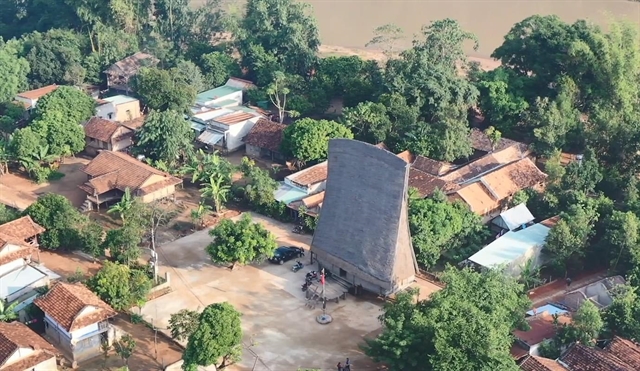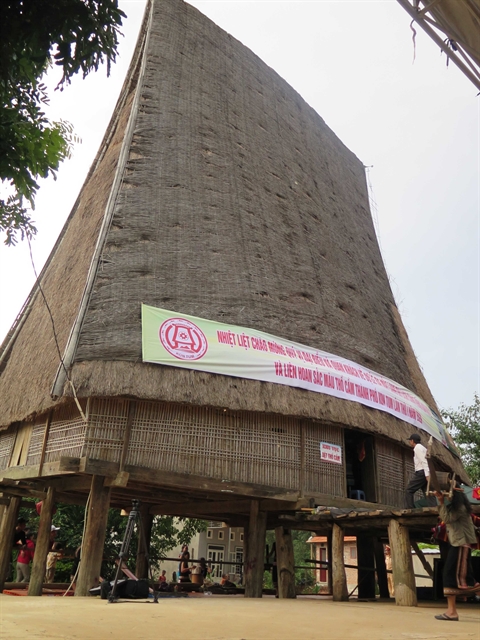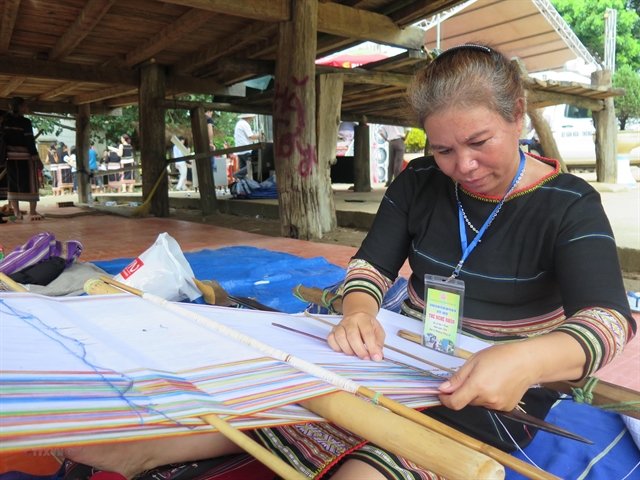[ad_1]

Lâm Thanh
As an ancient village in a mountainous area, the Kon Kơ Tu community-based tourism village in Kon Tum City attracts visitors because of the pristine beauty of the local Ba Na ethnic culture.
The village is located on the banks of the Đăk Bla River and is one of the oldest villages in Kon Tum City in the province of the same name.
Coming here, we admired the Rông long house soaring in the blue sky which is a community house for the common activities of villagers such as meetings, festivals, or welcoming, and also immersed ourselves in xoang dances, participated in hand-loom weaving and danced with the people to the sound of gongs.
On the way, we saw the winding paths along the legendary Đăk Bla River. The two sides of the road to the village are full of pink grass. In the distance are sandy beaches adorned with light purple sugarcane mixed with overlapping mountains to create a peaceful village scene.
Entering the village, we felt a peace different from the noisy life outside. The fun and refreshing laughter of the children mixed with the sound of weaving and the sound of carving statues to create a beautiful old village.
Currently, Kon Kơ Tu Village has 92 households with 530 Ba Na people. Because the village was formed very early, it still retains its ancient, wild and majestic natural beauty.
Standing in Kon Kơ Tu and looking to the east, we could see the top of Kong Muk Mountain reflected on the Đăk Bla River. About 5km along the bank of the river is a flat, sandy beach that embraces the ancient village like a mother holding her child in her heart.
Pristine architecture
Although it is the oldest village in the city, Kon Kơ Tu still retains the pristine beauty of a Ba Na village.
Surrounding the long communal house is a system of stilt houses facing the south as in the local traditions, this is a favourable direction to improve the luck and lives of the villagers.
The village still has more than 20 stilt houses built in the traditional style. A Ba Na stilt house is characterised by a rectangular model with an average length of about 10m. Each house consists of 12 pillars and is divided equally by six pillars on each side to create stability and balance for the house. The Ba Na often set up pillars of houses made of various kinds of wood. The stairs of the house are usually made of wood and meticulously carved.

In the long stilt houses, there will usually be three to four generations of the Ba Na living together.
The Kon Kơ Tu villagers are very hospitable. In addition to cultural exchange and getting acquainted with folk songs and traditional musical instruments of gongs, we participated in the new rice festival.
In the afternoon, we rented boats to admire the romantic Đăk Bla River and enjoy the clear, fresh air of the mountains and rivers here.
At night, we enjoyed rượu cần (wine drunk out of a jar through pipes) of the Ba Na people and heard them talk about their lives, as well as the cultural customs in the region. And of course, we enjoyed the local food like fried forest bamboo shoots, grilled chicken with salt and pepper and river fish.
The Kon Kơ Tu community-based tourism village just debuted in July last year.
According to Kon Kơ Tu villager A Kâm, local tourism has grown in recent years but local people were mostly disorganised. After the People’s Committee of Kon Tum City launched a project to support the development of community-based tourism in villages last year, tourism in the locality has developed even further.

A woman weaves brocade at Kon Kơ Tu community-based tourism village. — Photo kontumcity.kontum.gov.vn
With the support of the municipal People’s Committee and preferential loans, many households have invested in building and upgrading houses, rooms and campuses. They have also offered new kinds of tours with different experiences to attract tourists.
With the unique architecture and cultural features of the Ba Na, Kon Kơ Tu Village is an attractive destination in Kon Tum. — VNS
[ad_2]
Source link